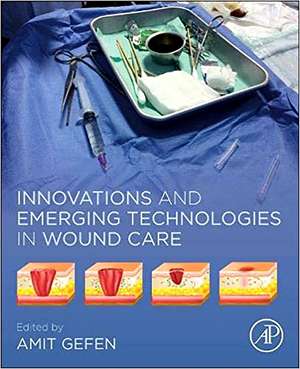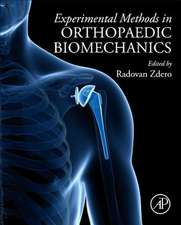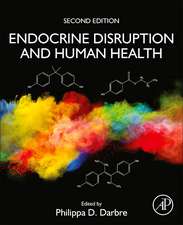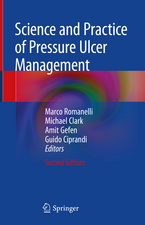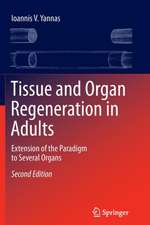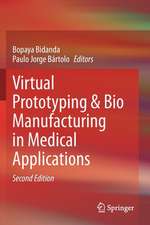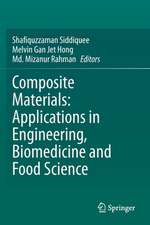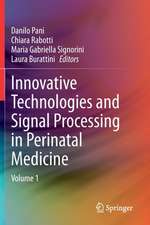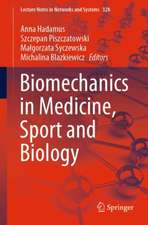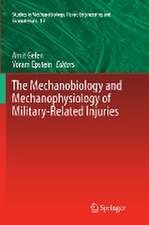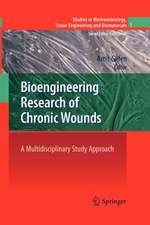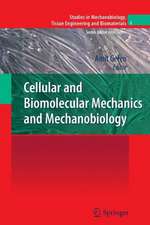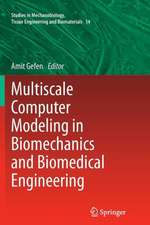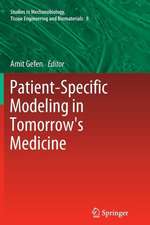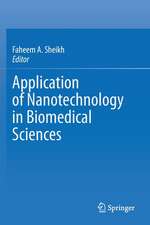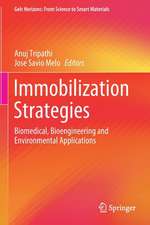Innovations and Emerging Technologies in Wound Care
Editat de Amit Gefenen Limba Engleză Paperback – 22 oct 2019
Users will find this resource to be a complete picture of the latest knowledge on the tolerance of human tissues to sustained mechanical and thermal loads that also provides a deeper understanding of the risk for onset and development of chronic wounds.
- Describes the state-of-knowledge in wound research, including tissue damage cascades and healing processes
- Covers all state-of-the-art technology in wound prevention, diagnosis, prognosis and treatment
- Discusses emerging research directions and future technology trends in the field of wound prevention and care
- Offers a bench-to-bedside exploration of the key issues that affect the practice of prevention and management of non-healing wounds
Preț: 954.65 lei
Preț vechi: 1265.24 lei
-25% Nou
Puncte Express: 1432
Preț estimativ în valută:
182.70€ • 190.03$ • 150.83£
182.70€ • 190.03$ • 150.83£
Carte tipărită la comandă
Livrare economică 07-21 aprilie
Preluare comenzi: 021 569.72.76
Specificații
ISBN-13: 9780128150283
ISBN-10: 0128150289
Pagini: 464
Dimensiuni: 191 x 235 mm
Greutate: 0.7 kg
Editura: ELSEVIER SCIENCE
ISBN-10: 0128150289
Pagini: 464
Dimensiuni: 191 x 235 mm
Greutate: 0.7 kg
Editura: ELSEVIER SCIENCE
Cuprins
Aetiology and pathogenesis of common wounds
1. Tissue changes with age, disease and chronic conditions
2. Pressure ulcers and diabetic foot ulcers
3. Venous, arterial and lymphedema wounds
4. Burns
5. Surgical and traumatic wounds
6. Wounds associated with prosthetic use
7. Infections in wounds
Bioengineering in diagnosis and prognosis
8. Sensors and systems for detecting tissue damage
9. Biomarkers in skin, sweat, blood and urine
10. Optical and imaging modalities for assessing potential tissue damage
11. Wound infection detection assays and technologies
Biomedical engineering approaches to prevention
12. Materials and designs of support and tissue-interfacing surfaces
13. Biomechanical engineering design of prophylactic dressings
14. Protecting tissues from medical device-related injuries
15.Computer-aided sensing and monitoring of tissue exposure to body loads
16. Electrical stimulation technologies to preserve tissue tolerance to loads
17. Biotechnology of nutritional supplements
Advanced treatments and clinical outcomes
18. Innovations in dressing materials and structures
19. New approaches to wound cleansing and debridement
20. Emerging negative pressure therapy technologies
21. Technologies for closure and repair of large wounds
22. Trends in compression therapies
23. Cell and tissue engineering approaches and related topical agents
24. Gene therapy and stem cell research relevant to wound healing
1. Tissue changes with age, disease and chronic conditions
2. Pressure ulcers and diabetic foot ulcers
3. Venous, arterial and lymphedema wounds
4. Burns
5. Surgical and traumatic wounds
6. Wounds associated with prosthetic use
7. Infections in wounds
Bioengineering in diagnosis and prognosis
8. Sensors and systems for detecting tissue damage
9. Biomarkers in skin, sweat, blood and urine
10. Optical and imaging modalities for assessing potential tissue damage
11. Wound infection detection assays and technologies
Biomedical engineering approaches to prevention
12. Materials and designs of support and tissue-interfacing surfaces
13. Biomechanical engineering design of prophylactic dressings
14. Protecting tissues from medical device-related injuries
15.Computer-aided sensing and monitoring of tissue exposure to body loads
16. Electrical stimulation technologies to preserve tissue tolerance to loads
17. Biotechnology of nutritional supplements
Advanced treatments and clinical outcomes
18. Innovations in dressing materials and structures
19. New approaches to wound cleansing and debridement
20. Emerging negative pressure therapy technologies
21. Technologies for closure and repair of large wounds
22. Trends in compression therapies
23. Cell and tissue engineering approaches and related topical agents
24. Gene therapy and stem cell research relevant to wound healing
